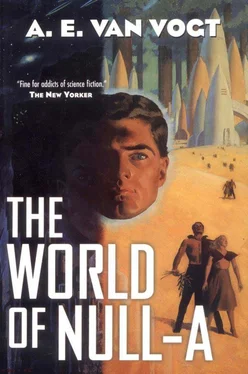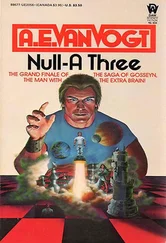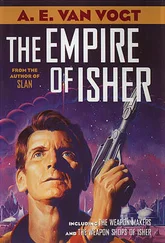Alfred van Vogt - The World of Null-A
Здесь есть возможность читать онлайн «Alfred van Vogt - The World of Null-A» весь текст электронной книги совершенно бесплатно (целиком полную версию без сокращений). В некоторых случаях можно слушать аудио, скачать через торрент в формате fb2 и присутствует краткое содержание. Жанр: Фантастика и фэнтези, на английском языке. Описание произведения, (предисловие) а так же отзывы посетителей доступны на портале библиотеки ЛибКат.
- Название:The World of Null-A
- Автор:
- Жанр:
- Год:неизвестен
- ISBN:нет данных
- Рейтинг книги:4 / 5. Голосов: 1
-
Избранное:Добавить в избранное
- Отзывы:
-
Ваша оценка:
- 80
- 1
- 2
- 3
- 4
- 5
The World of Null-A: краткое содержание, описание и аннотация
Предлагаем к чтению аннотацию, описание, краткое содержание или предисловие (зависит от того, что написал сам автор книги «The World of Null-A»). Если вы не нашли необходимую информацию о книге — напишите в комментариях, мы постараемся отыскать её.
It tells the story of Gilbert Gosseyn, a man living in an apparent utopia in which those with superior understanding and mental control rule the rest of humanity. But when Gosseyn wants to be tested by the giant Machine that determines such superiority, he finds that his world is not as it appears.
The World of Null-A — читать онлайн бесплатно полную книгу (весь текст) целиком
Ниже представлен текст книги, разбитый по страницам. Система сохранения места последней прочитанной страницы, позволяет с удобством читать онлайн бесплатно книгу «The World of Null-A», без необходимости каждый раз заново искать на чём Вы остановились. Поставьте закладку, и сможете в любой момент перейти на страницу, на которой закончили чтение.
Интервал:
Закладка:
When I say above that “apparently” it didn't matter in the physical sciences, or the “exact sciences” as they are so often called, the truth is that it does matter there also. Every individual scientist is limited in his ability to abstract data from Nature by the brainwashing he has received from his parents and in school. As the General Semanticist would say, each scientific researcher “trails his history” into every research project. Thus, a physicist with less educational or personal rigidity can solve a problem that was beyond the ability (to abstract) of another physicist.
In short, the observer always is, and always has to be a “me” . . . a specific person.
Accordingly, as World of Null-A opens, my hero–Gilbert Gosseyn–becomes aware that he is not who he thinks. He has a belief about himself that is false.
Now, consider–analogically, this is true of all of us. Only, we are so far gone into falseness, so acceptant of our limited role, that we never question it at all.
. . . To continue with the story of World: Not knowing who he is, nevertheless, my protagonist gradually becomes familiar with his “identity.” Which essentially means that he abstracts significance from the events that occur and gives them power over him. Presently he begins to feel that the part of his identity that he has abstracted is the whole.
This is demonstrated in the second novel, The Players of Null-A. In this sequel story, Gilbert Gosseyn rejects all attempts at being someone else. Since he is not consciously abstracting in this area (of identity), he remains a pawn. For a person who is rigidly bound by identifications with what might be called the noise of the universe, the world is rich and colorful, not he. His identity seems to be something because it is recording this enormous number of impacts from the environment.
The sum total of Gosseyn's abstractions from the environment–this includes his proprioceptive perceptions of his own body–constitutes his memory.
Thus, I presented the thought in these stories that memory equals identity.
But I didn't say it. I dramatized it.
For example: a third of the way through World, Gosseyn is violently killed. But there he is again at the beginning of the next chapter, apparently the same person but in another body. Because he has the previous body's memories, he accepts that he is the same identity.
An inverted example: At the end of Players, the main antagonist, who believes in a specific religion, kills his god. It is too deadly a reality for him to confront; so he has to forget it. But to forget something so all-embracing, he must forget everything he ever knew. He forgets who he is.
In short, no-memory equates with no-self.
When you read World and Players, you'll see how consistently this idea is adhered to and–now that it has been called to your attention–how precise is the development.
I cannot at the moment recall a novel written prior to World of Null-A that had a deeper meaning than that which showed on the surface. Science fiction often seems so complicated all by itself when written straightforwardly without innuendoes or subtle implications on more than one level, that it seems downright cruel of a writer to add an extra dimension that is hidden. A recent example of such a two-level science fiction novel is the first of that genre written by the British existentialist philosopher, Colin Wilson, titled The Mind Parasites. The protagonist of Parasites was one of the New Men–an existentialist, in short.
In World, we have the Null-A (non-Aristotelian) man, who thinks gradational scale, not black and white–without, however, becoming a rebel or a cynic, or a conspirator, in any current meaning of the term. A little bit of this in the Communist hierarchies, Asia and Africa in general, and our own Wall Street and Deep South, and in other either–or thinking areas . . . and we'd soon have a more progressive planet.
Science fiction writers have recently been greatly concerned with characterization in science fiction. A few writers in the field have even managed to convey that their science fiction has this priceless quality.
To set the record straight as to where I stand in this controversy–in the Null-A stories I characterize identity itself.
Of greater significance than any squabble between a writer and his critics . . . General Semantics continues to have a meaningful message for the world today.
Did you read in the newspapers at the time about S. I. Hayakawa's handling of the San Francisco State College riots of 1968–69? They were among the first, and the most serious–out of control and dangerous. The president of the college resigned. Hayakawa was appointed interim president. What did he do? Well, Professor Hayakawa is today's Mr. Null-A himself, the elected head of the International Society for General Semantics. He moved into that riot with the sure awareness that in such situations communication is the key. But you must communicate in relation to the rules that the other side is operating by.
The honest demands of the people with genuine grievances were instantly over–met on the basis of better–thought. But the conspirators don't even know today what hit them and why they lost their forward impetus.
Such also happens in the fable of Gilbert GoSANE in The World of Null-A.
A. E. VAN VOGT
I
Common sense, do what it will, cannot avoid being surprised occasionally. The object of science is to spare it this emotion and create mental habits which shall be in such close accord with the habits of the world as to secure that nothing shall be unexpected.
B. R.The occupants of each floor of the hotel must as usual during the games form their own protective groups. . . .”
Gosseyn stared somberly out of the curving corner window of his hotel room. From its thirty-story vantage point, he could see the city of the Machine spread out below him. The day was bright and clear, and the span of his vision was tremendous. To his left, he could see a blue-black river sparkling with the waves whipped up by the late-afternoon breeze. To the north, the low mountains stood out sharply against the high backdrop of the blue sky.
That was the visible periphery. Within the confines of the mountains and the river, the buildings that he could see crowded along the broad streets. Mostly, they were homes with bright roofs that glinted among palms and semitropical trees. But here and there were other hotels, and more tall buildings not identifiable at first glance.
The Machine itself stood on the leveled crest of a mountain.
It was a scintillating, silvery shaft rearing up into the sky nearly five miles away. Its gardens, and the presidential mansion near by, were partially concealed behind trees. But Gosseyn felt no interest in the setting. The Machine itself overshadowed every other object in his field of vision.
The sight of it was immensely bracing. In spite of himself, in spite of his dark mood, Gosseyn experienced a sense of wonder. Here he was, at long last, to participate in the games of the Machine–the games which meant wealth and position for those who were partially successful, and the trip to Venus for the special group that won top honors.
For years he had wanted to come, but it had taken her death to make it possible. Everything, Gosseyn thought bleakly, had its price. In all his dreams of this day, he had never suspected that she would not be there beside him, competing herself for the great prizes. In those days, when they had planned and studied together, it was power and position that had shaped their hopes. Going to Venus neither Patricia nor he had been able to imagine, nor had they considered it. Now, for him alone, the power and wealth meant nothing. It was the remoteness, the unthinkableness, the mystery of Venus, with its promise of forgetfulness, that attracted. He felt himself aloof from the materialism of Earth. In a completely unreligious sense, he longed for spiritual surcease.
Читать дальшеИнтервал:
Закладка:
Похожие книги на «The World of Null-A»
Представляем Вашему вниманию похожие книги на «The World of Null-A» списком для выбора. Мы отобрали схожую по названию и смыслу литературу в надежде предоставить читателям больше вариантов отыскать новые, интересные, ещё непрочитанные произведения.
Обсуждение, отзывы о книге «The World of Null-A» и просто собственные мнения читателей. Оставьте ваши комментарии, напишите, что Вы думаете о произведении, его смысле или главных героях. Укажите что конкретно понравилось, а что нет, и почему Вы так считаете.










